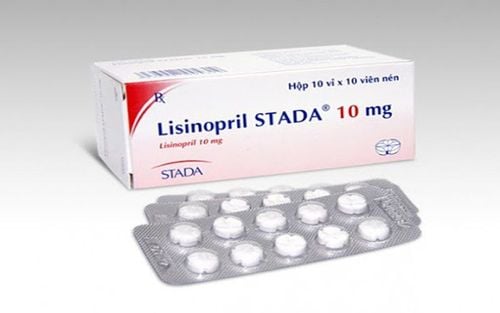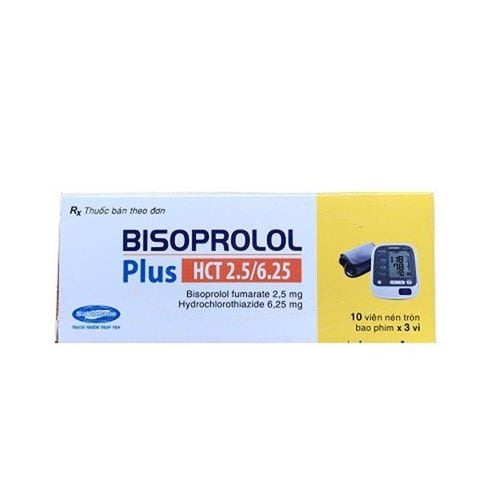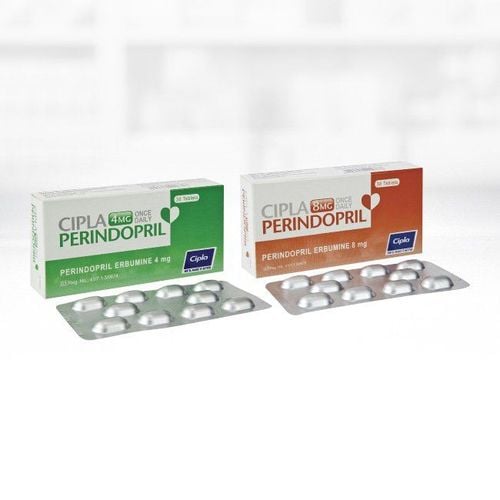This is an automatically translated article.
Drug Agicardi is a selective beta-blocker of the sympathetic nervous system, the main effect on the heart to help reduce heart rate, reduce cardiac output. Since then, the drug is often indicated in the treatment of hypertension, stable heart failure.
1. Effects of the drug Agicardi
Agicardi 5mg medicine has the main ingredient Bisoprolol Fumarate with the content of 5mg. Agicardi is available in the form of film-coated tablets.
Bisoprolol is a selective beta1 (β1) receptor blocker with no membrane stabilizing properties and no intrinsic sympathomimetic effects when administered within the therapeutic dose range. Selective blocking of beta1 receptors (primary cardiac receptors) helps to avoid the side effects of beta2 receptor blockade (respiratory and airway constriction when inhibited)
At low doses, the drug bisoprolol selectively inhibits the response to adrenaline stimulation by competitive blocking of cardiac beta 1 adrenergic receptors, but shows little effect on β2 adrenergic receptors of bronchial smooth muscle and vascular walls. With high doses above 20 mg: The selectivity of bisoprolol on β1 receptors is often reduced and the drug will cause inhibition of both β1 and β2 receptors. The drug Agicardi (Bisoprolol) thanks to its beta-blocking effect, is indicated for the treatment of the following conditions:
Treatment of hypertension : The drug is as effective as other beta-blockers. The mechanism of antihypertensive effect of bisoprolol may include factors such as decreased cardiac output, inhibition of renal renin release, and decreased heart rate both at rest and during exercise. To control blood pressure well, you may be prescribed to use it in combination with other drugs. Indicated in the treatment of stable chronic heart failure, moderate to severe, with reduced left ventricular systolic function: Beta-blockers including bisoprolol have been used in combination with angiotensin-converting enzyme inhibitors, diuretics, and diuretics. and cardiac glycosides for the treatment of heart failure due to left ventricular dysfunction, to reduce progressive heart failure. Long-term use of beta-blockers, as well as ACE inhibitors, may reduce symptoms of heart failure and improve the clinical condition of people with chronic heart failure. Treatment of angina in coronary artery disease: Because the drug has the effect of reducing heart rate, reducing myocardial demand, it can be used in angina pectoris.
2. Dosage and usage of the drug Agicardi
2.1 Administration The drug is taken orally. You can take Agicardi before or during breakfast. Patients should take the medicine regularly at a certain time to increase the effectiveness of the drug.
2.2 Dosage Treatment of hypertension, angina: The first dose is usually 2.5 - 5 mg and used once a day. The dose may be increased to 10 mg once daily, up to a maximum of 20 mg once daily. In patients with bronchospasm and asthma, the starting dose is 2.5 mg once daily. Stable chronic heart failure: Treatment must be monitored by a cardiologist, the dose is gradually increased by 1.25 mg x 1 time / day (morning) within 1 week; if tolerated, increase dose to 2.5 mg once daily for 1 week; if well tolerated can be increased to 5 mg once daily for 4 weeks; if tolerated can continue to increase to 7.5 mg x 1 time / day for 4 weeks; If well tolerated, may be increased to 10 mg once daily for maintenance therapy. The maximum recommended dose is 10 mg once daily. Renal or hepatic impairment in patients with chronic heart failure: There are no data for bisoprolol in patients with chronic heart failure with impaired hepatic or renal function. Dosing and dose escalation in these patients should be done with extreme caution. Elderly: No dosage adjustment is required. Children: There are no specific data, so the drug is not recommended for use in children. 2.3 Overdosage and missed dose Overdose: There have been a few cases of patient overdose with bisoprolol fumarate. Signs of beta-blocker overdose include bradycardia, hypotension, lethargy; If severe, delirium, coma, convulsions and respiratory arrest occur. Congestive heart failure, bronchospasm, and hypoglycemia may occur, especially in individuals with pre-existing diseases of these organs. If an overdose occurs, the patient must stop bisoprolol and take him to a medical facility for symptomatic supportive treatment.
Missed dose: If you forget to take a dose, take it as soon as possible. However, if it is almost time for your next dose, skip the missed dose and take your next dose at the scheduled time. You should not take double the prescribed dose.
3. Contraindications of the drug Agicardi
Agicardi is contraindicated in the following cases:
Patients with hypersensitivity to the active ingredient bisoprolol fumarate or to the excipients of the drug. Patients with cardiogenic shock, acute heart failure; Patients with heart failure not controlled by basic therapy, severe grade III or grade IV heart failure; Atrioventricular block – 2nd or 3rd degree ventricle and sinus bradycardia (less than 60 beats/min before treatment), sinus node disease; Severe asthma or severe chronic obstructive pulmonary disease. Severe Raynaud's syndrome. Concomitant use with MAO inhibitors or for 14 days after taking an MAO inhibitor. Metabolic acidosis. Patient has untreated pheochromocytoma. Children.
4. Side effects of the drug Agicardi
When using Agicardi you may encounter unwanted effects as follows:
Common: Digestive disorders causing diarrhea, vomiting; Rhinitis ; Weakness, fatigue. Uncommon: Joint pain; Decreased sensation, difficulty sleeping; slow heart rate; Shortness of breath; Chest pain, peripheral edema. When you experience side effects of the drug, the patient should notify the doctor soon or go to the nearest medical facility for timely treatment.
5. Notes when using Agicardi
To ensure safe drug use, you should note the following:
Do not stop taking the drug suddenly, because it can increase angina, ventricular arrhythmias, cause myocardial infarction in patients with In patients with coronary artery disease, if the drug must be stopped, the dose should be gradually reduced. Use with caution in patients with peripheral vascular disease, bronchospasm (bronchial asthma, respiratory obstructive disease), patients with renal or hepatic impairment; untreated congestive heart failure. The drug may mask manifestations of hypoglycemia such as tachycardia and clinical manifestations of hyperthyroidism. Therefore, caution should be exercised in people with this condition for early detection of hypoglycemia or signs of hyperthyroidism. According to new recommendations for the treatment of hypertension, beta-blockers are not the preferred choice for the treatment of hypertension, but are often considered an alternative when the preferred options are not tolerated or contraindicated. determined. The order of drug selection should be followed in the treatment of high blood pressure. Ability to drive and use machines: The effects of the drug on the ability to drive and use machines have not been adequately studied. However, depending on the individual response and due to the different effects of the drug, you may have an impaired ability to drive and use machines. Special care should be taken when starting treatment and when increasing the dose or when taking the drug with alcohol. Pregnancy: Bisoprolol should be used during pregnancy only if the potential benefits outweigh the risks. Lactation: It is not known whether bisoprolol is excreted in human milk. Since many drugs are excreted in human milk in studies, caution should be exercised when bisoprolol is administered to a nursing woman. Risk of Anaphylactic Reactions: While taking beta-blockers, patients with a history of severe anaphylactic reactions to various allergens may react more strongly with repeated administration. Such severely allergic patients may not respond to the doses of epinephrine normally used to treat allergic reactions, prompting attention to emergency measures. Storage: You should store the medicine in a sealed package, the temperature is below 30 degrees Celsius, away from moisture and light. This medicine, like any other medicine, should be kept out of the reach of children.
6. Drug interactions
Do not combine bisoprolol with other beta-blockers. Close monitoring of patients receiving catecholamine-depleting agents such as reserpine or guanethidine should be undertaken, since the additional beta-adrenergic blocking effects may cause an excessive decrease in sympathetic nervous system activity. In patients treated concomitantly with clonidine, if it is necessary to stop treatment, Bisoprolol should be stopped several days before stopping Clonidine. Caution should be exercised while bisoprolol is administered concomitantly with inotropic agents or drugs that inhibit atrioventricular conduction such as some calcium antagonists, particularly of the phenylalkylamine (verapamil) and benzothiazepine (diltiazem), or antiarrhythmic drugs such as disopyramide. Concomitant use of rifampicin increases the metabolic clearance of bisoprolol, resulting in a shortening of the elimination half-life of bisoprolol. However, no first dose adjustment is usually required. Agicardi is used under the prescription and close monitoring of a cardiologist. You need to have regular check-ups so you can assess your response to medication and make sure it's safe to take.
Follow Vinmec International General Hospital website to get more health, nutrition and beauty information to protect the health of yourself and your loved ones in your family.













